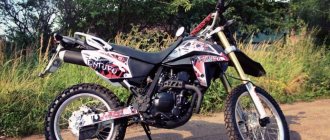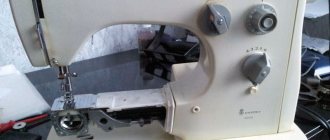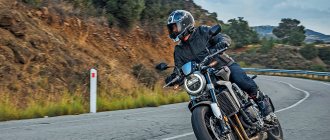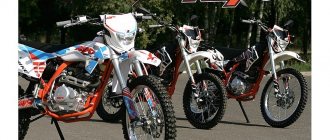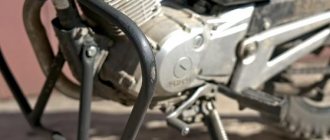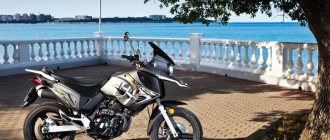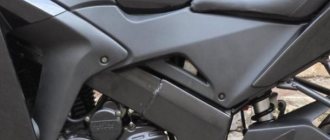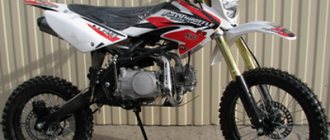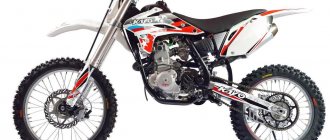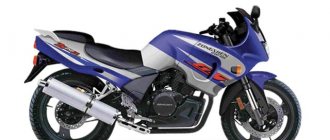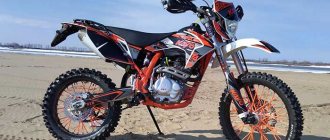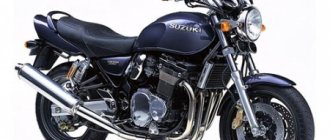RU-MOTO rating
- Reliability
- Chassis
- Appearance
- Comfort
3.5
Verdict
A review of the powerful and sporty Kayo T2 250 Enduro pit bike shows that it overcomes various obstacles excellently. This model is worth a closer look if you are looking for a motorcycle not only for riding on the highway. For beginner riders, it is a reliable, ideal model.
The motorcycle of the famous Kayo brand is the undisputed leader in its class. Kayo T2 250 Enduro is a step above classic pit bike models due to its excellent cross-country performance in cross-country races. For Kayo T2, the real elements are extreme conditions outside the monotonous city traffic.
Pitbike Kayo T2 250 Enduro
The flagship model has been on the market for several years now, with no intention of giving up its position. Inexpensive, but quite powerful and lightweight, this option is often considered by those who are purchasing a two-wheeled friend for the first time. The all-terrain vehicle easily passes through fields, rough terrain, climbs hills, dirt is not a hindrance to it.
Read other motorcycle reviews Detailed review of the Yamaha YZF-R6 motorcycle
The Motorcycle Sports Association specially developed this unit for participation in athletics cross-country competitions. Its sporting success contributed to the promotion of similar models to a wide range of consumers. Several modifications have been developed: Enduro and the classic cross version.
Specifications
The total tank volume is 9 liters and the engine power is more than 20 liters. With. allow you to run long distances without refueling. Due to the enlarged wheels and the uncharacteristic 250 cc engine, the manufacturer enlarged and strengthened the bike’s frame, leaving the structure itself as lightweight as possible.
Kayo T2 250 pit bike parameters:
- working volume - 249;
- power - 20.4;
- maximum speed - 100 km/h;
- gas tank capacity - 9.5 l;
- weight - 105-110 kg;
- Fuel consumption is 3.4 liters on the highway and 4.5 liters over rough terrain.
Prices for pit bikes Kayo T2 250
Let’s visually compile a list of the main advantages and disadvantages:
Advantages
- appearance
- durable, non-breakable plastic
- relatively good suspension
- light weight
- availability of PTS (except for older models)
Flaws
- weak rims
- trailing chain
- thin steering wheel
- price
In general terms, this is a very good motorcycle, with a minimum of shortcomings that are found in any Chinese technology. At least you know what you're paying for. I suggest writing reviews about the Kayo T2 motorcycle in the comments. We also recommend checking out the Kayo model.
Specifications
| Maximum engine power: | 20 HP |
| Working volume: | 223 cm3 |
| Motor type (cylinder arrangement, number of strokes): | 4T |
| Number of cylinders: | 1 |
| Number of valves: | |
| Intake type (Injector / Carburetor): | |
| Bore and stroke: | |
| Starting system (Electric starter, kick starter): | |
| Cooling system: | Air |
| Transmission (gearbox): | 5 |
| Clutch (Dry / Wet): | |
| Drive unit: | Chain |
| Chassis | |
| Suspension (front/rear travel): | |
| Brakes (Front/Rear): | |
| Wheels / Tires / Rubber: | |
| Dimensions and weight | |
| Dimensions (Length / Width): | |
| Seat height: | |
| Ground clearance: | |
| Curb weight: | |
| Wheelbase: | 1370 mm |
| Weight: | 110 kg |
| Fuel tank capacity: | 10 l. |
| Battery capacity: | |
| Year of release: | |
| Country of Origin: |
Prices
Motorcycle Enduro Kayo Super T2 21/18 (ZS 250 cc air cooled engine)
- Engine – 20.4 l. s./233 cm3
- Cost – 135,000 rubles.
Motorcycle Enduro Kayo Super T2 19/16 (ZS 250 cc air-cooled engine)
- Engine – 16.4 l. s./233 cm3
- Cost – 121,500 rubles.
Motorcycle Enduro Kayo Super T2 21/18 (ZS 150 cc air cooled engine)
- Engine – 16.4 l. s./233 cm3
- Cost – 72,000 rubles.
As a result, the cost of this motorcycle ranges from 120-135 thousand rubles, but used models can be purchased from 60-95 thousand rubles, depending on the condition of the motorcycle.
Sea trials
When you get behind the wheel of the Kayo T2 for the first time, you experience some inconvenience. The seat feels narrow and hard, making it difficult to get into neutral, and there is quite a bit of vibration from the engine, as there is no balance shaft. But once you go off-road, all this fades into the background. Control is easy and precise. The first gear is quite short, but you can drive it anywhere. For a primitive Chinese engine, the dynamics are sufficient for light enduro and the basics of motocross. By the way, the engine was borrowed from the Honda CRF 230, so there are no questions about reliability. It is very hardy, it is almost impossible to overheat. Maintenance costs pennies. However, we recommend refueling only 95 gasoline. At 92 the responsiveness is worse, and when going uphill you can even hear detonation. At low speeds, the Kayo T2 is sluggish, but if you turn the gas up to 6 thousand, the motorcycle willingly spins up to 9 thousand rpm.
The fork works quite well, there are even adjustments for stiffness and rebound, like the rear shock absorber, it works well. Yes, by the way, Kayo T2 enduro does not have such adjustments. As for the brakes, there are no complaints about the rear brake. The foot brake lever in the latest Kayo T2 models runs in an arc above the footrest, thereby eliminating braking from grass or branches packed under it. The front brake is a little lacking in grip. However, there are enough brakes for off-road use. Both brakes on reinforced hoses with 2 piston calipers are good because they have the same pads, this is a plus. I was pleased with the box. The shift of the gearbox foot is short, the gears shift clearly. And the lever itself is made of high-quality aluminum. When falling, the foot folds and remains intact. As are the footrests. Having a side stand is good.
The sound deserves high praise! Especially the 2013 model has a straight-through exhaust.
Newer models are somewhat quieter. The muffler can is made of very high quality, the diameter of the elbow is of good thickness, which has a positive effect on the responsiveness of the engine.
The downside to this motorcycle is the steel rims, which require attention in the form of tightening the spokes. When hitting a good hole, there is a high risk of damage to the rim. The next disadvantage is the chain. It stretches a lot on the first ride. Most owners immediately change it to Japanese. The weak point is the thin steel steering wheel, which bends a lot and even breaks if it hits the ground well. In early '13 models there were complaints about the rear sprocket falling off, the problem was solved by installing longer bolts with reinforced washers and nuts on the back of the hub. Some inconvenience is caused by starting with a kick starter, which rests against the driver’s right footrest until you fold it down. Some riders complain about the fork being stiff and not having full suspension travel. The problem goes away when you change the oil to a good fork oil with a viscosity index of 5W. The original carburetor requires tuning and some modification, in the form of replacing the main fuel jet from 102 to 109 or even 112 depending on climatic conditions, due to which the failures to open the handle will disappear and the power will increase slightly. Perhaps for some, the price will seem like a disadvantage of this motorcycle. The price for new copies in 2022 is about 133 thousand rubles. Kayo T2 Enduro will cost a couple thousand more. The cost of used devices ranges from 70 to 100 thousand, depending on the condition.
Tuning
The Enduro Kayo can be fully tuned technically, which will improve technical characteristics and ensure ease of use. Craftsmen carry out full or partial painting, change mirrors, springs for the footrest, and replace plastic handles with aluminum ones.
Read other motorcycle reviews Moped Alpha: price, photo and video review
To make the engine sparkle, it is chromed or polished using a special technology. A tuned motorcycle with creative airbrushing or special stickers looks stylish and attracts the attention of others.
Tuning pit bike Kayo T2 250
Major breakdowns and repairs
For its price category, this is an excellent model that does not require modifications after purchase, and if required, adjustments can be made manually. Among the shortcomings and breakdowns, we can note poorly tightened bolts securing the sprocket to the wheel hub, the electric starter may fail, and the teeth on the intermediate gear may break off.
To avoid minor troubles, after purchase you need to tighten all the bolts, change the oil, brake fluid and chain, and also saturate the filter with a special substance. It would be a good idea to find the countersunk screws and tighten them well or place them on the blue thread locker.
Approximate prices for spare parts and repairs
| Chain | 1850-2000 rub. |
| Rear caliper | 1450 rub. |
| Replacing clutch and brake levers with folding ones | 900 rub. |
| Rear sprocket | 1250 rub. |
| Replacing NGK spark plugs with Japan NGK | 190 rub. |
The most common breakdowns in Kayo T2 250
Comparison with analogues
The 2015 Kayo T2 250 Enduro motocross model differs from last year's model by a new high-speed rear sprocket, which gives the bike a more dashing start and power, as well as an increased fuel tank capacity of up to 9.5 liters. The brake foot is now on top of the footrest. Until 2015, it was located at the bottom, which caused some problems, as on the Irbis 125R. Although the headlight is small, it illuminates the road quite clearly and strongly, much better than on the Irbis.
Kayo T2 250 Enduro weighs 110 kg. The same BM Enduro 250DD, Zid Lifan LF200 or Irbis 250R with the same power weigh about 130 kg and are not so easy to move. Engine power 16 l. s., but they differ from the same ones as on Irbis. Acceleration is much faster here due to the shorter gears. It is comfortable to drive and accelerate on it, although the maximum speed is no more than 100 km/h. The comfortable maximum speed of Lifan or Irbis, although higher, is not much higher.
Although the suspension is not top-end, you can feel the difference compared to Irbis or Lifan. Compared to the Irbis TTR 250, the Kayo T2 250 has a more stylish appearance and a stronger rear shock absorber. The Racer Enduro RC250XZR cannot accommodate a passenger, unlike the Kayo two-seater.
Why the Kayo model is worse than its competitors:
- The KMC 520 chain, although better than that of other Kayo models, is somewhat behind the quality of its competitors;
- the tank is slightly smaller than the BM Enduro, and the BM also has better wheels;
- the cost of motorcycles of the same class costs an order of magnitude less - around 105-110 thousand rubles, in contrast to 135 thousand for the Kayo T2 250 Enduro.
Reviews
Judging by the reviews, owners of this model note easy control, excellent assembly, good factory shock absorbers, which do not have to immediately look for a replacement, as in other models.
Screenshot of review No. 1
Victor
I bought myself a Kayo Enduro motorcycle, and at a price of 83,000 rubles from the first batch. I really liked the powerful engine and the fact that the bike is light. It can be transformed to suit your needs. I needed a headlight, and the wiring is here, I just changed the front shield and installed a headlight. The frame also allows you to install the engine you want. Kayo Enduro is equipped with good suspension, both front and rear. Convenient oil change. I liked the LED optics, there is registration and many other nice features, such as a high-quality rear shock absorber, an adjustable soft fork and protection on the stays.
In Kayo t2 250 enduro, the design has become even more attractive and creative, emphasizing the sporty style. This is not a Harley-Davidson, but in its price segment it looks very stylish. In the video you can see all the attractiveness of the model. I drove around the city and beyond at a good speed.
Screenshot of review No. 2
Good evening bikepost! Join the ranks of the Kayovods) On the holiday of February 23, I became the owner of the updated Kayo T2 Enduro 2020 model year. Since there is very little information about this motorcycle on the Internet, I decided to write a post about first impressions, about what has changed compared to previous years of production, in case it turns out to someone useful, because I myself learned a lot of what I needed from this blog. First, a brief history of selection and acquisition:
The idea of buying a motorcycle came to me last summer. At the moment I am 27 years old, I am married and I am the father of two charming children (and now my wife is carrying a third child), everything in life has settled down, I have my own house and car. Somehow thoughts began to come to me buy pepelats for the soul, light rides around the village. You can say that memories came back, my motorcycle experience began at the age of 8 when my father (who had several motorcycles in his youth) bought me a Mokik LMZ Mini. Happiness knew no bounds! After that there were Mokiki Verkhovyna and Karpaty Sport. At the age of 14 I got a Voskhod 3M, I drove it for a short time, about one season. It was followed by a practically new Minsk 3.112 with a mileage of 1200 km) I was very lucky with it - my neighbors bought it preserved in the original box, one might say a time capsule. The neighbor practically didn’t ride it, very rarely went fishing. Then they suddenly decided to move to another city, sold the house, it was the last day before leaving and they couldn’t sell the motorcycle. Well, they did it for me an offer that I couldn’t refuse. The last one was IZH Jupiter-4K, which I rode until my student years. This is the most problematic and troublesome motorcycle I’ve ever encountered. I changed almost everything in it) After many years, it just came flooding back, I opened category A , revived Jupiter, which had been sitting in a garage for a lot of years, and went for a ride. I wanted to ride along rivers, through forests, and ride through ravines like before, but on something that was more suitable for this. I decided to take it in the winter so that I could slowly prepare the motorcycle and open the season on a new one. technology. And the requirements were simple: enduro with a 172 engine, PTS and a budget of 130 thousand. As it turned out, there were very few options: Regulmoto Sport 003, Regulmoto ZR250, Avantis FX 250 LUX and Motoland XT250ST. Initially I planned to take Sport 003 since it has a nice price tag, normal oil seal chain, protection of levers and engine included. But alas, it turned out to be unexpectedly high on the saddle, however, as it turned out, this applies to all the planned options. Reguli touched live, at first glance, good motorcycles for a more than adequate price tag. I didn’t like the ZR that there is no access to the carburetor at all and the partition for the battery does not allow you to remove the air filter. But it’s beautiful) Avantis was not available, but according to the seller it is also tall, I didn’t seriously consider the XT250ST since it was beyond the budget and there were reviews about it They were extremely mixed at the time when I was looking for information on it. In general, the only option suitable for my height was T2. Taking into account the holiday discount, it practically fit into the budget.
Technical specifications (from the manufacturer's website):
Base, mm: 1375 Weight, kg: 107 Seat height, mm: 850 Engine: Single-cylinder, 4-stroke (ZONGSHEN ZS172FMM) Length*Width*Height, mm: 2070*820*1150 Tank capacity, l.: 10 Rear brake : Hydraulic disc Rear suspension: Monoshock absorber 420 mm, adjustable Wheels: 21/18 Capacity, cc: 250 Power, hp: 21 Cooling: Air Front brake: Hydraulic disc Front suspension: Telescopic, inverted type, 800 mm, adjustable Transmission: 5-speed 1-N-2-3-4-5 Fuel supply system: NIBBI PE28 carburetor
Differences from previous years of production that caught my eye:
Different engine - ZS172FMM No kickstarter (unfortunately) New beautiful instrument panel New plastic, fenders have become noticeably longer, side plastic has changed shape slightly Updated seat space (battery placement and filter box changed) Different air filter New graphics Slightly changed the shape of the saddle The upper part of the tank is now flush with the saddle The muffler at first glance is the same as on the T2G Passenger footrests from the T2G New brake foot The switch moved to a box with a filter Added a trunk mount on the same ear as the muffler. The bushings that were constantly getting lost are now gone The brake machine is now the same as on the T4
First impressions:
Since I bought it assembled (unfortunately it wasn’t in the box), there were small mistakes in the assembly in the form of some loose fasteners. What was tightened at the factory was tightened conscientiously, sometimes with a force for which plasticine fasteners are not designed) I wanted to remove the battery and leave the pepelats in the garage before warming, but this turned out to be another task - in order to remove the plastic, you need to remove the trunk (and the battery frame) and it was impossible to remove it due to the bolts being too tight; with a knob - the result is licked edges. As a result, the motorcycle settled in the entryway, fortunately my wife doesn’t mind) At the moment, I rode it around the yard and that’s it, I will only use it after lubricating all the bearings, checking the seals and replacing all the technical fluids, which is what the next posts will be about. The plastic fits well and is quite flexible, but if you look at the edge in places there is a fray, which indicates that the production culture is not the highest. The shape of the plastic itself has changed slightly for more comfortable movement in the rack. The wings, both front and rear, have become longer so that there is less dirt thrown in. Tank is now flush with the saddle and has changed a little overall. There is a bypass hose on the tank. The saddle has slightly changed its shape, the rigidity is moderate. One seat mounting bolt has been added. Underneath there are radical updates - the battery has moved under the side plastic, the filter has been slightly modified and is now placed in a plastic box with a lid. The switch moved into the same box.
The first thing that catches your eye when you get behind the wheel is the updated instrument panel. The analog tachometer has sunk into oblivion, giving way to a more modern electronic device. There are: digital speedometer, odometer, tripmeter, gear indicator, tachometer tape, clock and voltage in the on-board network. There are also warning lamps for low/high beam, turn signals and a neutral indicator. The backlight is orange, a pleasant rich shade. If desired, you can switch the speed display and mileage from kilometers to miles by long pressing the right button. With a short press, the switching occurs between the odometer and tripmeter. The left button with a long press allows you to set the time.
The steering wheel seems to have migrated without changes. It looks quite solid. The grips and levers are the most ordinary, soft. On the left side of the steering wheel there is a lighting control panel, on it there is also a killswitch, a horn button and an electric starter lever. The turn signals and the headlight are LED. They shine quite brightly but turned on only in the garage, I can’t say yet how in real conditions.
The front suspension is adjustable with pressure relief valves, also moved from the previous T2 without changes. There are stay protection and covers. The rear suspension is also adjustable, in a cover and also without changes. There is a progression that I have not had time to look into yet. More about the operation of the suspension I’ll tell you in the following posts after the first rides and customization. Now let’s move on to the largest update on this motorcycle.
The marking on the engine, as is often the case, is 169, for the sake of simplifying certification. But the size of the cylinder can be seen with the naked eye that this is a ZS172FMM. In my opinion, this is the only motorcycle with a 172 engine that does not have a kick starter) The decision is extremely controversial, but I can only go with this will put up with it. The foot is folding, from the previous T2 and is not very suitable for this engine; here it would be more appropriate to have a foot like those that are installed on the GR7. On site, the gears shift quite clearly, neutral is easily caught. I’ll check it soon on the move). Fuel supply carried out by the currently popular NIBBI PE28 carburetor.
The carburetor bears the Kayo brand logo. According to information that I have not personally verified, it has a 120 fuel jet and a 40 idle jet. The suction is not convenient; I would prefer a carriage on the steering wheel. There is a fuel purification filter.
The exhaust is from the T2G (or at least looks very similar). It sounds nice and bassy.
To summarize, I can say that the first impressions are positive. Thick fork crowbars, a thick pendulum, a frame made of pipes of different profiles and diameters look solid. The seating position is comfortable, nothing interferes with standing in a static position. The saddle is comfortable. Convenient access to all units. But there are strange engineering solutions, the wiring is not laid out very well in some places, the fasteners are mediocre. A full opinion will only be given after the start of operation. Thank you for reading, I promise to delight you with posts about preparation for operation, riding, maintenance, accessories, equipment and simply about what happens to the motorcycle without embellishment. See you in the next post!
Pros and cons of the Kayo T2 250 Enduro pit bike
Advantages and disadvantages of Kayo T2 250
Read other motorcycle reviews Classic Dream - review of the Honda CB400 motorcycle
pros
In addition to reasonable cost, a pit bike has many tangible advantages:
- Simplicity of the unit design, everything is configured and adjusted manually, the number of breakdowns is reduced to a minimum;
- The relatively low cost of servicing a Chinese bike compared to its Japanese counterparts. There are always motorcycle parts for it at a reasonable price and you don’t have to wait as long for them as parts for Japanese models;
- It starts quickly, delighting with a powerful engine sound. With it you can conquer any roads, even difficult ones;
- The grippy disc brakes do their job superbly. The brake handle folds when falling, which will be appreciated by those who have already broken it when falling from other motorcycles;
- High-quality assembly and plastic housing. The increased size of the saddle is a nice bonus.
Minuses
- The standard 520 chain stretches and requires further replacement;
- The number plate mount is fragile and may crack after several falls;
- Narrow saddle, although this defect was corrected in 2015;
- The sprocket mounting bolts burst.
First impression
The first thing you want to pay attention to in Kayo T2 is its harmonious appearance. Clear fender lines, wide handlebars with soft protection with a prominent Kayo logo, inverted fork, silicone grips, narrow saddle for better control in the rack, a real box filter and a “correct” air filter. The headlight, despite its modest size, perfectly illuminates the road, while its power is only 35 watts with standard switching between low and high beam. The Chinese did not skimp on the quality of graphics, and the color scheme changes every year. For example, in the photo below the color version of 2016 is the most successful in my opinion.
The strength of the plastic is also excellent. Compared to other similar motorcycles, it is very durable due to its thickness and flexibility. The gas tank is also made of plastic and its volume is 9.5 liters. The main feature of Kayo T2 250 is its light weight. The dry weight of the motorcycle, like the Kayo K1 250 model, is 105 kg, which is comparable to a good KTM! In this parameter, it has no equal among its Chinese counterparts; its competitors weigh around 120-130 kg.
